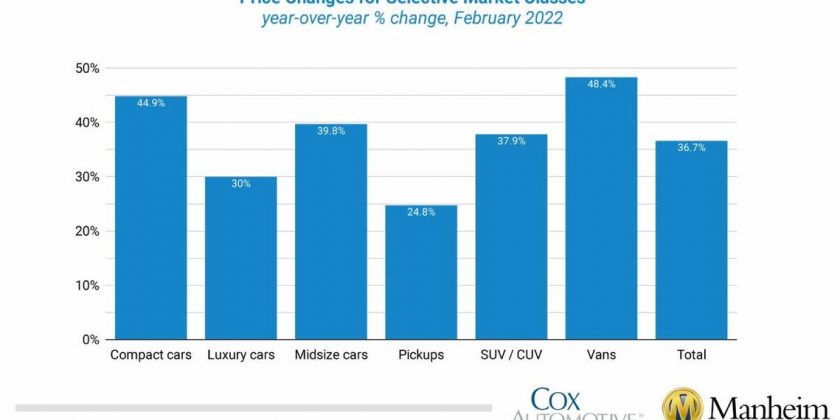Pickups had the smallest year-over-year gains at 9.6%, vans had the largest at 37.5%, and both non-luxury car segments outpaced the overall industry in seasonally adjusted year-over-year gains.
Source: Cox/Manheim
Wholesale used-vehicle prices (on a mix-, mileage-, and seasonally adjusted basis) declined 3.8% in the first 15 days of March compared to the full month of February, according to Manheim figures released March 17.
This brought the Manheim Used Vehicle Value Index to 222.4, which was up 24.1% from March 2021. The non-adjusted price change in the first half of March was an increase of 0.1% compared to February, leaving the unadjusted average price up 22.6% year over year.
Manheim Market Report (MMR) prices saw a small decline followed by a small gain over the first two weeks of March. The Three-Year-Old MMR Index, which represents the largest model-year cohort at auction, experienced a 0.1% cumulative decline over the last two weeks. During the first 15 days of March, MMR Retention, which is the average difference in price relative to current MMR, averaged 100%, which indicates that valuation models are accurately following market prices.
The average daily sales conversion rate of 56.4% in the first half of March increased relative to February’s daily average of 48.7% but remains lower than average for this time of year. The latest trends in the key indicators suggest wholesale used-vehicle values will likely see increases in the second half of the month.
All major market segments saw seasonally adjusted prices that were higher year over year in the first half of March. Pickups had the smallest year-over-year gains at 9.6%, vans had the largest at 37.5%, and both non-luxury car segments outpaced the overall industry in seasonally adjusted year-over-year gains. Compared to February, all major segments except vans saw seasonally adjusted price declines, with SUVs declining the most. The seasonal adjustment drove most of the declines. Most major market segments saw unadjusted price gains from February with compact and midsize cars increasing the most, while SUVs and vans declined.
Used supply tightening in March: Using estimates based on vAuto data, used retail days’ supply declined six days from the 51 days measured at the end of February. Days’ supply as of midmonth was up six days year over year. Leveraging Manheim sales and inventory data, Manheim estimates that wholesale supply ended February at 28 days, down three days from the end of January but up three days year over year. As of March 15, wholesale supply was at 26 days, down two days from the end of February but up four days year over year.
Rental risk prices decline: The average price for rental risk units sold at auction in the first 15 days of March was up 30% year over year. Rental risk prices were down 1.4% compared to the full month of February. Average mileage for rental risk units in the first half of March (at 62,450 miles) was up 7% compared to a year ago and up 5.4% month over month.
Auto loan delinquencies back to normal, but defaults remain relatively low: Auto loan performance deteriorated again in February as the abnormally strong credit performance for much of the pandemic has returned to more normal patterns of delinquencies. The over 60-day delinquencies increased in February for the ninth month in a row and were up 10.4% year over year. In February, 1.58% of auto loans were severely delinquent, which was an increase from 1.51% in January and the highest severe delinquency rate since December 2019. Compared to a year ago, the severe delinquency rate was 16 basis points higher. In February, 5.99% of subprime loans were severely delinquent, which was an increase from 5.74% in January and the highest severe delinquency rate in the data series back to 2006.
The subprime severe delinquency rate was 85 basis points higher year over year. Higher delinquencies are not leading to pre-pandemic levels of defaults yet. Loan defaults increased 17.4% in February from January and were up 9.1% year over year. Auto credit access expanded in February according to the Dealertrack Credit Availability Index for all types of auto loans. The index in February was the highest recorded in the data series going back to January 2015.
Source: Read Full Article

